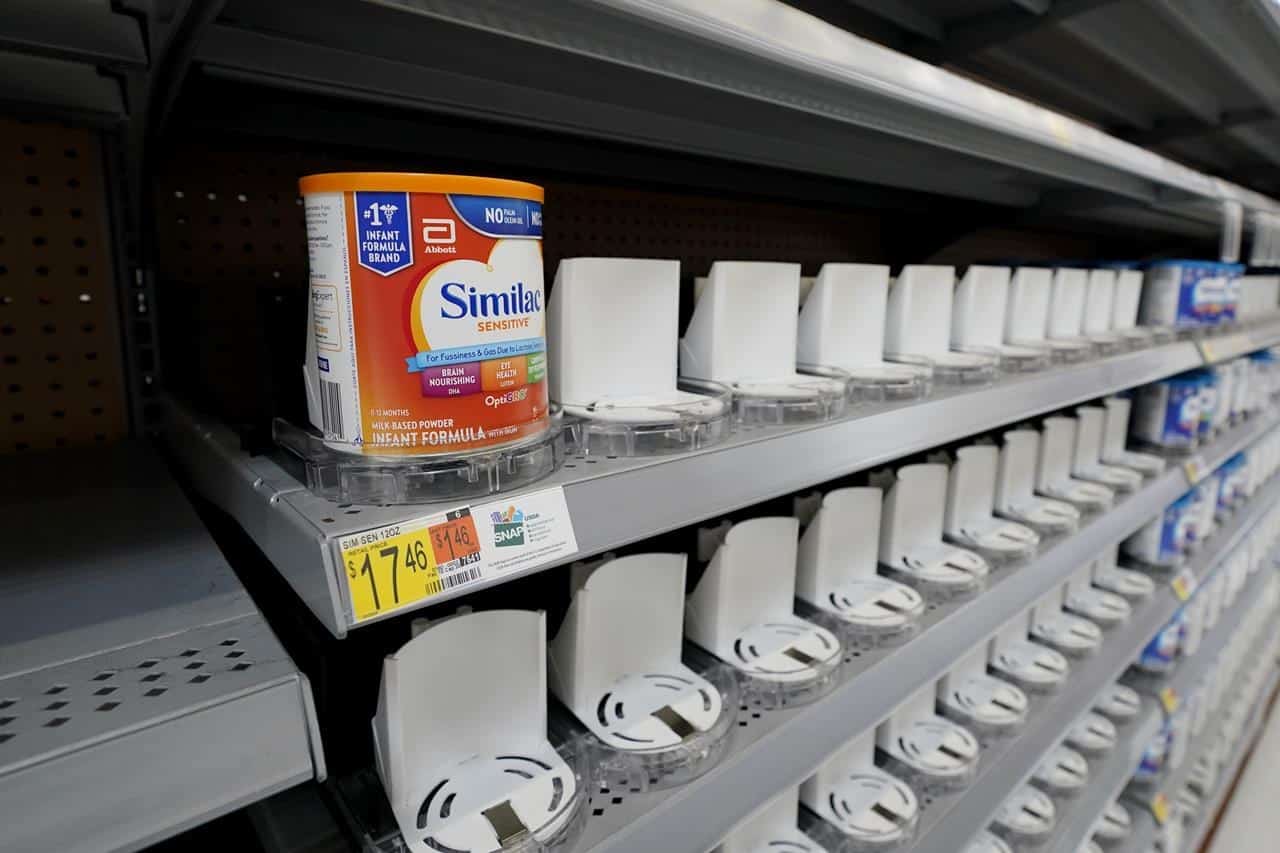Why doesn’t Canada make its own baby formula when we have the raw ingredients?
Published April 18, 2023 at 6:55 pm

If infant formula has become akin to liquid gold for parents stressed about empty store shelves this year, Canada may be sitting on a potential treasure trove — if only it could process the raw elements.
There is a surplus of the main ingredient for infant formula, but without processing capacity, dairy producers say a lot of it is either going to waste or being sold on the cheap as animal feed.
The material, called solids non-fat, is basically what is left over from raw cows’ milk once it has been processed and the fat removed for use in other products such as butter.
“There’s relatively more demand for butter fat than solids non-fat,” said Mathieu Frigon, the president of the Dairy Processors Association Of Canada.
“You cannot tell a cow, ‘Only produce butter fat, but no solids non-fat.'”
As a result, about 19 per cent of what is produced in Canada is considered surplus. It is either thrown away, sold to “low-value” markets as animal feed, or donated to food banks, the Canadian Dairy Commission said in a statement.
That problem has only become worse over the last five or six years, Frigon said, as demand for butter fat has gone up and demand for the leftovers has not.
Canada has so much of it that in the 2023 federal budget, the government set aside $333 million to help the dairy industry figure out what to do with it all.
Solids non-fat has traditionally been used to make skim milk, Greek yogurts, some cheeses and things like protein powder. It’s also the main ingredient in infant formula, which has been in scarce supply in Canada for more than a year.
That shortage started when a manufacturing plant in the United States that made a large portion of Canada’s baby formula supply closed for several months after a product recall in February 2022.
It reopened four months later but still isn’t up to full capacity.
There used to be plants in Canada, but over time they moved across the border. Now the country relies entirely on imports to feed babies that aren’t breastfed.
Health Canada says while there is enough supply of regular formula in Canada, not all brands are available. Lower-cost brands are particularly short.
To turn the extra solids non-fat into baby formula, it needs to be specially processed to make it easy for tiny stomachs to digest.
Manufacturers are interested in making baby formula in Canada again, but the Food, Health and Consumer Products of Canada says the rules here are so strict it makes it difficult to justify the investment.
“We do have the ingredients that we could use, but … it’s really prohibitive for a manufacturer to invest in Canada,” said Michi Furuya Chang, vice-president of public policy and regulatory affairs for the industry group.
She said it takes Health Canada a long time to approve formulas for distribution in Canada compared to the United States — in some cases, it’s taken more than four times as long.
“We’re calling for an efficient, but of course risk-based, modernized regulatory system here in Canada to incentivize the investment in manufacturing again, bring it back domestically and then help that industry grow, innovate and compete using the ingredients that we have an abundance here in Canada,” she said, adding that discussions with the government have been very positive.
Federal Health Minister Jean-Yves Duclos says processing infant formula is an important goal to shore up Canada’s supply, but it won’t happen soon.
“To set up the factory that is safe and sound takes a lot of time, so we can’t wait that much time for infant formula to be accessible in Canada,” Duclos said in an interview last week.
Canada Royal Milk has set up a factory to produce infant formula in Kingston, Ont. The company was established by Feihe International, the largest producer of formula for infants and young children in China.
The company applied to Health Canada for approval in Summer 2022, and is still waiting for an answer. The company has plans to export its products, but will focus on Canadian distribution first.
In the meantime, Health Canada is temporarily importing 70 different formula products from countries with high quality and manufacturing standards similar to Canada.
For its part, the Canadian Dairy Commission said the industry is sparing no effort to make sure none of the milk products in Canada go to waste.
Canada had been shipping some solids non-fat to Mexico, said Tyler McCann, the managing director of the Canadian Agri-Food Policy Institute. That changed when the new Canada-United States-Mexico trade agreement was signed.
“That market in Mexico that the Canadian exporters found is a market that (was) being filled by the Americans, and the Americans did not like that we were taking that market away,” he said.
Similar caps also apply to bulk exports of baby formula, said Frigon, creating another impediment to domestic manufacturing.
He said the simple solution is to build processing plants to make things like infant formula, but there’s also an opportunity to develop new products altogether.
“There’s also this new space, especially when you get into health products, where you can take those proteins and those protein isolates and produce new, more innovative value-added products,” he said.
The $333-million fund set aside by the Liberals in the budget will be used to research what else could be made with the leftover dairy materials over the next 10 years, help develop processing capacity, and market the products.
INsauga's Editorial Standards and Policies